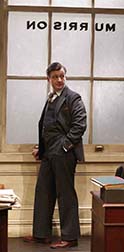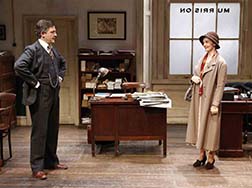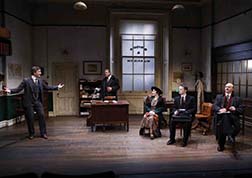By Lucy Komisar
This rather conventional play by J.B. Priestley (famous for “An Inspector Calls”) occurs and premiered in London in 1935, a period of economic crisis. It’s not brilliant, but it is engrossing.

Briggs and Murrison, a London dealer in aluminum, is going through a rough patch. Trade is devastated by the conflict in Europe. A cable from the company man in Ottawa says embargo is certain on everything but low-grade sheet metal. Murrison has gone into the country seeking orders to save the company from collapse. Jim Cornelius (Alan Cox) is in the office trying to stave off the creditors.
The set features old wood desks and a green bookkeeper‘s lamp. Cornelius wears pin stripes. The Depression and the European war are referred to only obliquely. Director Sam Yates, following Priestley’s text, treats events quite matter-of-factly rather than as high drama.
A door-to-door salesman selling stationary faints because he hasn‘t eaten. Cornelius gives him cash and wonders why the fellow can‘t get a job. He says to the bookkeeper, Mr. Biddle (the very staid and proper Col Farrell), “I can‘t believe it. If you‘re willing to work hard, willing to take risks, ready to be scorched or frozen, drowned or sent half mad with thirst there must be openings for you somewhere in the world. They can‘t have closed everything up, so that we‘re all like bees in a glass case. It‘s unthinkable, Biddle.” Of course, that’s the theory of the system, but a businessman couldn’t be so naive as to believe it.
In the midst of the financial crisis, Cornelius is also fighting “the system,” effected by crooks who he calls “twisters.” One gave him a phony price that wasn‘t honored. He tells his secretary, “Lots of young men like that about, Miss Porrin (the mousy Pandora Colin). Twisters. If you have it out with some of them, they tell you it‘s not their fault, it‘s the system. God knows I don‘t admire the system. If there is one, it‘s getting me down. But they‘d still be twisting under any system. They couldn‘t go straight on a desert island.”

Cox as Cornelius is a charmer, a debonair David Niven type in his early 50s. In the midst of the company crisis, there‘s also a quiet love triangle of sentiment if not actions. Miss Porrin, the company secretary for years, is secretly in love with the bachelor Cornelius.
He becomes infatuated with Judy Evison (Emily Barber), a pretty young lady who arrives to take the place of her sister who‘s had to leave town to care for a sick husband. Miss Porrin burns when she sees Cornelius admire Miss Evison. When Evison tells Cornelius that Miss Porrin is in love with him, he gets angry: “We don‘t say things like that here.”
Sometimes the play seems a bit of a soap opera of the sort British TV is famous for. A mix of politics, history and personal drama. It‘s quite old-fashioned. The characters are stock figures, the kind that were on the British stage for years. The cast portrays them quite expertly.
The crisis occurs when the creditors arrive. Again, politics mixes in obliquely. Cornelius, increasingly bitter, tells Biddle, “These fellows who are coming here this afternoon, Biddle, they don‘t want chaps like you as cashiers. They want Einstein….Yes, Einstein as cashier, and Mussolini and Hitler and the storm troops as salesmen.”

He complains, “Some countries you couldn‘t get money into. Some countries you couldn‘t get money out of. You could send goods in a ship with a blue flag but not in a ship with a red flag. It wasn‘t business anymore. It was a game of snakes and ladders”but without the ladders.” So, an international crisis is crushing ordinary people in its grip. It‘s all put rather subtly. Cornelius never overtly challenges the system.
The banker Mortimer (Robin Browne) takes over the creditors‘ meeting. But there‘s little hope. When Murrison (Jamie Newall) shows up, he seems paranoid and talks about being followed. Unless he had worked miracles, the firm would be bankrupt.
Later, the play gets corny when the distraught Cornelius places a gun on his desk. His other choice is represented by a book on the Andes, a promise of adventure. It shows that for Priestley the response to economic crisis was personal rather than political. Cornelius never becomes one of the politically aware characters of Clifford Odets who wrote in the same period. He certainly does not presage the anti-heroes of the angry young men playwrights who raised questions about the economic system in the fifties. They make Priestley seem quaint.
“Cornelius.” Written by J.B. Priestley; directed by Sam Yates. Jagged Fence, Handsome Dog and 31 Productions, part of the Brits on Broadway series at 59E59 Theaters, 59 East 59th Street, New York City. 212.279.4200. Opened June 11, 2013; closes June 30, 2013. 6/29/13.

